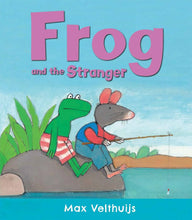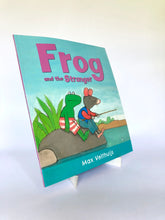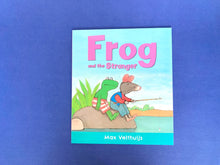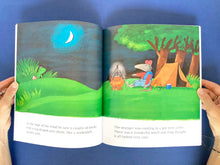
The simple tale carries a strong message, however, and should be helpful in explaining discrimination to young children.
When Rat comes to live at the edge of their wood, the animals decide they don't like having a stranger in their midst. But Frog is friendly by nature, and decides to find out if Rat is really as unpleasant as he is made out to be. As Frog discovers, Rat is intelligent and good hearted, and proves in a series of unexpected emergencies that the other animals have been too quick to condemn him.
Reviews:
Pig and Duck are suspicious of Rat when he arrives as a stranger in their community. Duck says, ""You have to be careful of rats. They're a thieving lot."" Frog keeps an open mind, though, and gets to know the newcomer before judging him.
The simple tale carries a strong message, however, and should be helpful in explaining discrimination to young children. Frog persists in being friendly to Rat even when the others express disapproval. He is strong enough to hold on to his own sense of what is right. Although Rat has done nothing wrong, he must go to heroic measures (saving Pig from a fire and rescuing Hare from drowning) just to be treated with common curtesy. The brightly colored drawings give the animals personality and add appeal to the tale. The design is uncluttered and inviting. A useful lesson in values where needed. School Library Journal
Frog and his cohorts are depicted in simple, graceful lines that give full expression to their endearing foibles, from Pig's stubbornness to Frog's childlike curiosity and innocence. However, the book's message is conveyed somewhat heavyhandedly and its tensions are disappointingly resolved (that Rat is accepted only after heroically proving his helpfulness dilutes the lesson about tolerance), with the result that this venture is less engaging than Frog in Winter and Frog in Love. Publishers Weekly









